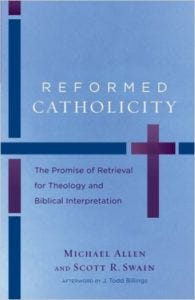Recasting Sola Scriptura: Allen and Swain’s Reformed Catholicity

In my review of Mark Noll’s book, In the Beginning Was the Word: The Bible in American Public Life, 1492–1783, I described Noll’s discussion of how American colonists transformed the sola scriptura principle of “the Bible supreme” into “the Bible only.” That story recounts some negative consequences of such a shift and also raises certain theological questions beyond the purview of Noll’s book. In Reformed Catholicity: The Promise of Retrieval for Theology and Biblical Interpretation (Baker Academic, 2015), Michael Allen and Scott Swain make a similar observation about Protestants, but they look at it from the viewpoint of theologians, pointing to dangers with sola scripture from a Reformed point of view and addressing some of the very theological issues raised in Noll’s book (though not interacting with his work directly).
What exactly do they mean by the term catholicity? They explain that they understand catholicity not in the narrower sense of Roman Catholic but in the early-church sense of the church catholic, or the church universal. As J. Todd Billings describes in his afterword to the book, this approach to theology is catholic in the sense that “it gives a Trinitarian (Nicene) account that holds to the cosmic centrality of Jesus Christ as the mediator between Creator and creation (Chalcedonian)” (152). Those who appreciate the discipline of church history can likewise appreciate their desire to root their modern theological program in the theology of the ancient church councils.
To do so as Reformed theologians, however, they have to wrestle with the Protestant watchword sola Scriptura and what it means for that other term that evangelicals so often malign: tradition. As they look back at the reformers, Allen and Swain show that sola Scriptura—what they call “one of the most frequently misinterpreted tracts of Christian teaching”—was never meant to cut off all tradition (50). And here they echo Noll’s assessment of the reformers’ take on Scripture and tradition. Scripture was not meant to be “solo Scriptura” (85) but Scripture as the supreme authority. In their view, sola Scriptura is actually what makes the retrieval of a catholic tradition possible because it gives that tradition a norming norm: the Bible.
To establish that this is a Protestant view of tradition, the authors assert that Scripture itself presents a picture of the church being built on the foundation of Scripture. They argue that a Trinitarian perspective sees the Spirit as both inspiring the Word and illuminating the church. While Scripture is “the divinely authoritative and sufficient source of theology,” tradition is “the divinely appointed goal of theology”—that is, tradition is receiving Scripture in such a way that the Spirit changes us as we hear it (36).
Thus, the Spirit establishes very real authorities for guiding Christians in receiving Scripture. As noted, Scripture is the supreme authority, but there are other authorities that have real authority. The Bible appoints pastors to have real authority in local settings, and the church carries real authority particularly through its creeds and confessions. Far from killing all theological discussion, creeds and confessions make such discussion possible, providing parameters and guiding theology toward its goal of understanding Scripture not parochially but globally, not narrowly on single texts but broadly within the whole counsel of God (44, 99).
In writing this volume, the authors express concern that contemporary evangelical Christianity is drifting more and more toward what Christian Smith and others have labeled Moralistic Therapeutic Deism, with its focus on the individual’s happiness, on being a nice person, and on going to God only when I have problem (146). As Billings warns in the afterword, those in this vein tend to be “religious tinkerers,” people who pick and choose whatever they want from a smorgasbord of religious options to achieve their happiness (147). Instead, they suggest that Reformed catholicity can avoid both a theological eclecticism and a dead traditionalism by being both intensely biblical and unapologetically Christ-centered. This approach can open constructive avenues while also providing needed guardrails.
Allen and Swain describe their book Reformed Catholicity as a manifesto of sorts, a way forward to a more robust theology in our day. For more of what this theological program might look like in its specifics, they offer their coedited volume, Christian Dogmatics: Reformed Theology for the Church Catholic (Baker Academic, 2016). While they approach these issues from a primarily theological viewpoint, they exhibit a healthy respect for the historical aspects of theology. And for those who see value in engaging with theology of the past, this book presents a commendable vision for retrieving that theology within a historically Reformed framework that guards against both an overreaching traditionalism and an unmoored biblicism.


